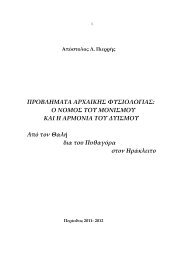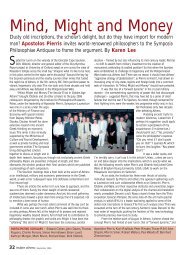chapter 10 the monism of darkness and the dualism of limit and ...
chapter 10 the monism of darkness and the dualism of limit and ...
chapter 10 the monism of darkness and the dualism of limit and ...
You also want an ePaper? Increase the reach of your titles
YUMPU automatically turns print PDFs into web optimized ePapers that Google loves.
<strong>10</strong>0 CHAPTER <strong>10</strong><br />
Eros is <strong>the</strong> moving force in Hesiod’s Theogony <strong>and</strong> <strong>the</strong> third among <strong>the</strong><br />
primary principles after Chaos <strong>and</strong> <strong>the</strong> first stable form which is <strong>the</strong> Earth<br />
(with Tartarus located in Earth’s innermost nook, deepest bottom <strong>and</strong> root)<br />
116-122. In Orphic Tradition, Eros=Phanes=Protogonus is <strong>the</strong> first creator.<br />
The Primogenitus is Primocreator.<br />
5. For an etymological clarification <strong>of</strong> <strong>the</strong> Semitic Mot v. A.B. Cook, Zeus II,<br />
p. <strong>10</strong>38. The suggested interpretations include: Arabic madda=matter,<br />
substance (Ewald); water (Baudissin, Maspero); moch, mud, slime<br />
(Bunsen); mot Phoenician tehomot = female depth, abyss;<br />
mak=rottenness (Mclean). No matter how tentative <strong>the</strong>se interpretations<br />
<strong>and</strong> how hypo<strong>the</strong>tical <strong>the</strong> assumed connections are <strong>the</strong>y tend significantly<br />
to corroborate <strong>the</strong> correctness <strong>of</strong> Philo’s view.<br />
6. Eissfeld’s emendation (·ñÙÔÜ) is <strong>of</strong>ten accepted. However, ·éÙfi cannot<br />
refer to anything o<strong>the</strong>r than ÓÂÜÌ·; if appleÏÔ΋ or applefiıÔ˜ were meant <strong>the</strong><br />
pronoun used would have been masculine or feminine. Moreover, if <strong>the</strong><br />
sense were that <strong>the</strong> Spirit did not know its own creation (<strong>the</strong> coming-intobeing<br />
<strong>of</strong> itself), as <strong>the</strong> suggested emendation would want it, <strong>the</strong>n we can in<br />
a way respond to <strong>the</strong> objection that is based on <strong>the</strong> fact that Spirit as first<br />
principle must be eternal, precisely by invoking a necessary breach as it were<br />
in its continuity <strong>of</strong> everlastingness when <strong>the</strong> World’s existence is going to<br />
start; but even this is not altoge<strong>the</strong>r correct, since it is not <strong>the</strong> Spirit per se<br />
but Spirit’s Longing (fiıÔ˜) that determines <strong>the</strong> beginning <strong>of</strong> Time <strong>and</strong><br />
History. What is more, <strong>and</strong> more important, it is unlikely that <strong>the</strong> Spirit<br />
remained ignorant or unaware <strong>of</strong> its own beginning since it was <strong>the</strong> Spirit<br />
that longed for its own beginning <strong>and</strong> actually realized it precisely by its<br />
very desire. If <strong>the</strong> Spirit is ignorant <strong>of</strong> anything, it is ignorant <strong>of</strong> <strong>the</strong> result <strong>of</strong><br />
its beginning, <strong>of</strong> <strong>the</strong> product <strong>of</strong> its realized desire not to remain infinite but<br />
to acquire a beginning as a physical being.Manuscripts have ·éÙÔÜ <strong>and</strong><br />
·éÙ‹Ó.<br />
7. It is extremely characteristic that Damascius gives <strong>the</strong> series <strong>of</strong> <strong>of</strong>fspring in<br />
<strong>the</strong> order Air-Breeze, <strong>and</strong> it is clear why: <strong>the</strong> principle <strong>of</strong> mobility occupies,<br />
in all <strong>limit</strong>-friendly <strong>the</strong>ories, a secondary position vis-à-vis <strong>the</strong> principle <strong>of</strong><br />
definiteness <strong>and</strong> unchangeableness. He writes: \A¤Ú· ÁÂÓ¤Ûı·È ηd AûÚ·Ó,<br />
\A¤Ú· ÌbÓ ôÎÚ·ÙÔÓ ÙÔÜ ÓÔÂÚÔÜ apple·Ú·‰ËÏÔÜÓÙ˜, AûÚ·Ó ‰b Ùe âÍ<br />
·éÙÔÜ ÎÈÓÔ‡ÌÂÓÔÓ ÙÔÜ ÓÔËÙÔÜ ˙ˆÙÈÎeÓ appleÚÔÙ‡appleˆÌ·. The terminology is<br />
Neoplatonic; <strong>the</strong> experience <strong>and</strong> frame <strong>of</strong> mind primevally Greek.<br />
8. The Orphic <strong>the</strong>ogony according to <strong>the</strong> Sacred Doctrines in ΚΔ΄<br />
Rhapsodies is directly related to this type <strong>of</strong> Cosmogony. The supreme<br />
principle is Time. The primordial situation is characterized by ÛÎÔÙfiÂÛÛ·<br />
çÌ›¯ÏË (OF 67) <strong>and</strong> à˙˯b˜ ÛÎfiÙÔ˜ (OF 66. p. 148). Ae<strong>the</strong>r (OF 66 etc.)










